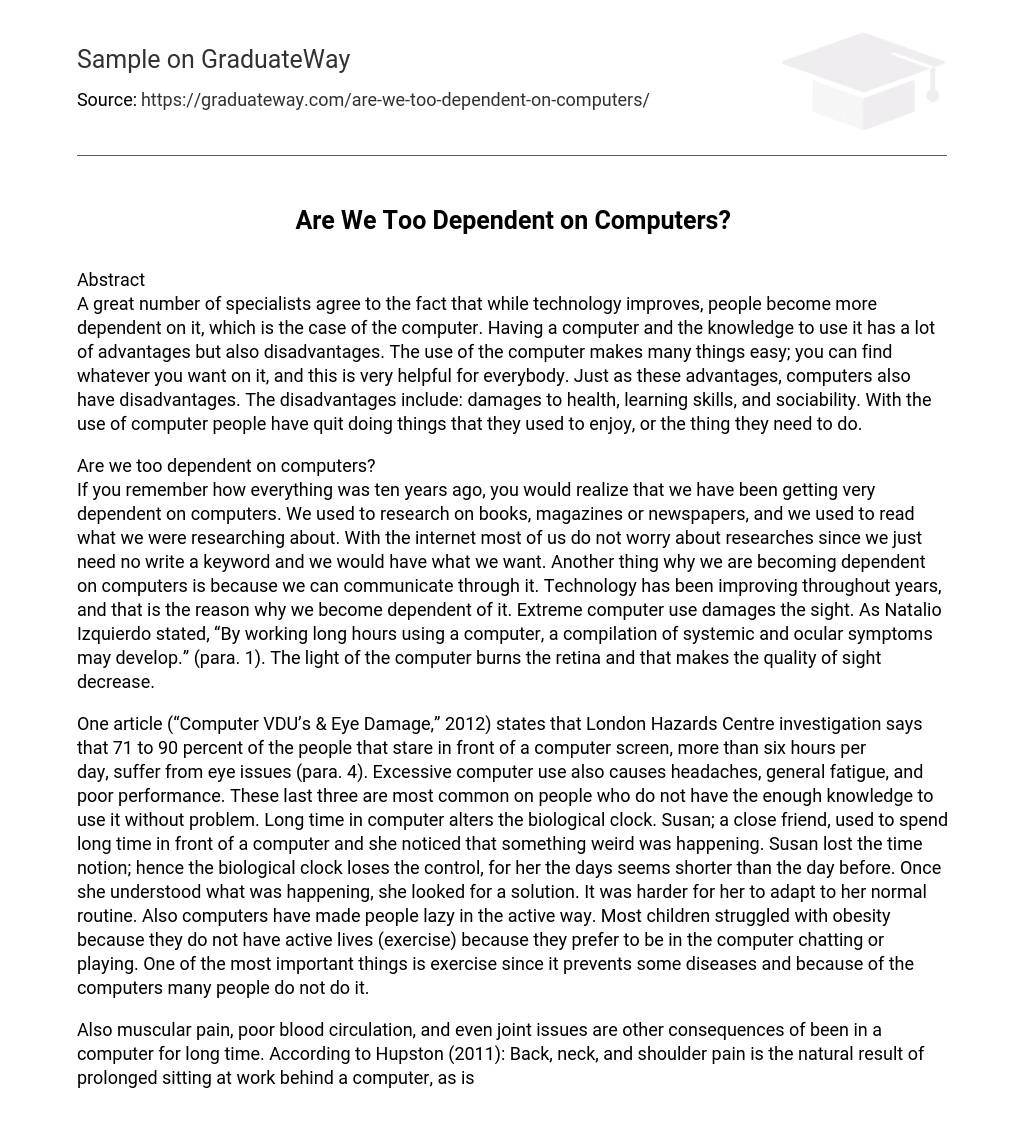Abstract
A great number of specialists agree to the fact that while technology improves, people become more dependent on it, which is the case of the computer. Having a computer and the knowledge to use it has a lot of advantages but also disadvantages. The use of the computer makes many things easy; you can find whatever you want on it, and this is very helpful for everybody. Just as these advantages, computers also have disadvantages. The disadvantages include: damages to health, learning skills, and sociability. With the use of computer people have quit doing things that they used to enjoy, or the thing they need to do.
Are we too dependent on computers?
If you remember how everything was ten years ago, you would realize that we have been getting very dependent on computers. We used to research on books, magazines or newspapers, and we used to read what we were researching about. With the internet most of us do not worry about researches since we just need no write a keyword and we would have what we want. Another thing why we are becoming dependent on computers is because we can communicate through it. Technology has been improving throughout years, and that is the reason why we become dependent of it. Extreme computer use damages the sight. As Natalio Izquierdo stated, “By working long hours using a computer, a compilation of systemic and ocular symptoms may develop.” (para. 1). The light of the computer burns the retina and that makes the quality of sight decrease.
One article (“Computer VDU’s & Eye Damage,” 2012) states that London Hazards Centre investigation says that 71 to 90 percent of the people that stare in front of a computer screen, more than six hours per day, suffer from eye issues (para. 4). Excessive computer use also causes headaches, general fatigue, and poor performance. These last three are most common on people who do not have the enough knowledge to use it without problem. Long time in computer alters the biological clock. Susan; a close friend, used to spend long time in front of a computer and she noticed that something weird was happening. Susan lost the time notion; hence the biological clock loses the control, for her the days seems shorter than the day before. Once she understood what was happening, she looked for a solution. It was harder for her to adapt to her normal routine. Also computers have made people lazy in the active way. Most children struggled with obesity because they do not have active lives (exercise) because they prefer to be in the computer chatting or playing. One of the most important things is exercise since it prevents some diseases and because of the computers many people do not do it.
Also muscular pain, poor blood circulation, and even joint issues are other consequences of been in a computer for long time. According to Hupston (2011): Back, neck, and shoulder pain is the natural result of prolonged sitting at work behind a computer, as is bad posture. This can cause headaches and excessive tension in neck, shoulders, arms, forearms, wrists, back, hips, thighs and legs. The result is increased fatigue to the muscles and ligaments supporting the lower back and this can eventually lead to tissue injury and spinal joint dysfunction. (para. 1). Sitting for long periods of time increases the possibility to have poor blood circulation. This happens because we tire or debilitate a muscle called psoas. The effect of damaging that muscles not only affects that, but also depletes vital energy and affects organ functions and the immune system. Moreover, excessive computer use affects general relationships. People stop interacting with other people. This is another problem, people need to interact with others, and this issue is most common in children and teenagers. Children and teenager are becoming “masters of computers” but they are losing the ability of interacting. Subrahmanyam, Kraut, Greenfield, and Gross (2011) have found that “teenagers are more likely to help parents with computers than parents are to help their children” (para. 1). Ten years ago the “normal” thing was the other way, parents helping their children. In the work of Subrahmanyam et al. (2011), “the lack of interaction with peers might be hindered in the development of interpersonal skills.” (para. 2). This means that people who does not interact may loss that ability. This problem is as big that Andrew McKillican (2000) compared living without computer to living without the industrial revolution. (para. 1). That comparison means that we really are dependent or addicted to computer. We can help each other to stop this. As mentioned at UT Dallas webpage (2011, Jan. 19), some signs that can help us to know if we are too much dependent/addicted are: unsuccessful efforts lose track of time, anxiety, neglect friends, and of course, excessive use of the computer (para. 5). People have to be conscious about this issue. Computer’ dependency affects everyone, from children to adults. We as adults must be the first to create awareness, that way we can help others. If someone is not one of those who spend a lot of hours in front of the computer, that one can star helping others. Some ways to help those who are computer’ dependents are: being a good role model, introducing them to other people, getting them involved, and talking with them to encourage them to reflect. Let’s start helping each other to quit to this addiction called, computer.
References
Greenfield, P., Gross, E., Kraut, R., and Subrahmanyam, K. (2011) Effects on Social Development and Relationships. Children and Computer Technology, 10, 1. Retrieved April 19, 2012 from http://www.futureofchildren.org Hupston, F. (2011, February 16). Prevent back, neck and shoulder pain from prolonged
sitting and bad posture. [Suplemental material] Natural News. Retrieved April 20,
2012 from http://www.naturalnews.com
Izquierdo, N. (2010, May 3) In Medscape. Retrieved from http//:wwwmedscape.com Self-help: Computer Addiction (2011,Jan. 19). UT Dallas’ Student Counseling Center,
Retrieved April 22, 2012 from http://www.utdallas.edu





